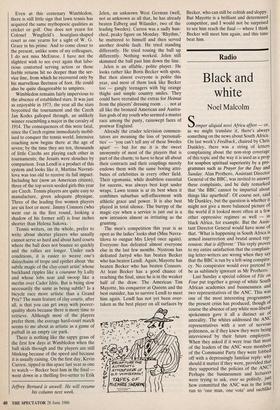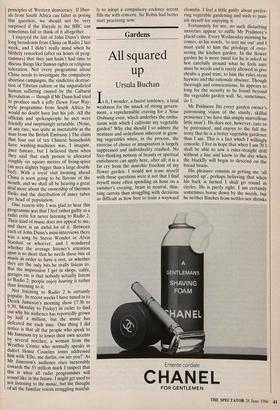Radio
Black and white
Noel Malcolm
Semper aliquid novi Africa affert — or, as we might translate it, there's always something on the news about South Africa. On last week's Feedback, chaired by Chris Dunkley, there was a string of letters complaining about the non-stop coverage of this topic and the way it is used as a prop for soapbox spiritual superiority by a pro- grammes such as Prayer for the Day and Sunday. Alan Prothero, Assistant Director General of the BBC, was invited to answer these complaints, and he duly remarked that 'the BBC cannot be impartial about things like apartheid'. Of course not, said Mr Dunkley, but the question is whether it might not give a more balanced picture of the world if it looked more often at a few other oppressive regimes as well — in black Africa, for example. But the Assis- tant Director General would have none of that. 'What is happening in South Africa is armed insurrection and brutal armed rep- ression: that is different.' This reply proves to my entire satisfaction that the complain- ing letter-writers are wrong when they say that the BBC is run by a left-wing conspira- cy. No conspirator would ever pretend to be as sublimely ignorant as Mr Prothero.
Last Sunday a special edition of File on Four put together a group of white South African academics and businessmen and two representatives of the ANC. This was one of the most interesting programmes the present crisis has produced, though of course the absence of any white non-liberal spokesmen gave it all a distinct air of unreality. The whites addressed the ANC representatives with a sort of nervous politeness, as if they knew they were being interviewed by their future employers. When they asked if it were true that most of the leaders of the ANC were members of the Communist Party they were fobbed off with a depressingly familiar reply: whY should it matter if they were, provided that they supported the policies of the ANC? Perhaps the businessmen and lecturers were trying to ask, ever so politely, just how committed the ANC was in the long run to 'one man, one vote' and suchlike principles of Western democracy. If liber- als from South Africa can falter in posing this question, we should not be very surprised if the liberals in the BBC can sometimes fail to think of it altogether.
I enjoyed the last of John Dunn's three long broadcasts from China on Radio 2 last week, and I didn't really mind when he blithely remarked (after six hours of prog- rammes) that they just hadn't had time to discuss things like human rights or religious toleration. Not every programme about China needs to investigate the compulsory abortion campaigns, the vindictive destruc- tion of Tibetan culture or the unparalleled human suffering caused by the Cultural Revolution — though if Mr Dunn had tried to produce such a jolly Down Your Way- style programme from South Africa he would no doubt have lost his job. All the officials and spokespeople he met were friendly and surprisingly scrutable. (None, at any rate, was quite as inscrutable as the man from the British Embassy.) The claim that four out of ten Chinese households have washing-machines was, I imagine, pure fantasy, but I believed them when they said that each person is allocated roughly six square metres of living-space (an area slightly bigger than a large double bed). With a royal visit looming ahead China is soon going to be flavour of the month, and we shall all be hearing a great deal more about the ownership of thermos flasks and the distribution of inner tubes per head of population. One reason why I was glad to hear this programme was that I feel rather guilty as a radio critic for never listening to Radio 2. Their kind of music does not appeal to me, and there is an awful lot of it. Between each of John Dunn's mini-interviews there was a song by Stevie Wonder or Alvin Stardust or whoever, and I wondered whether the average listener's attention span is so short that he needs these bits of music in order to have a rest, or whether they are the only bits he really listens to. But the impression I get in shops, cafés, garages etc is that nobody actually listens to Radio 2: people enjoy hearing it rather than listening to it. Not listening to Radio 2 is certainly popular. In recent weeks I have tuned in to Derek Jameson's morning show (7.30 to 9.30, Monday to Friday) in order to find out why his audience has reportedly grown by half a million, but the music has defeated me each time. One thing I did notice is that all the people who speak to Mr Jameson try to lower their own accents by several notches; a woman from the Weather Centre who normally speaks in dulcet Home Counties tones addressed him with 'Elio, me darlin, ow are you?' As Mr Jameson's audience rises inexorably towards the 55 million mark I suspect that this is what all radio programmes will sound like in the future. I might get used to not listening to the music, but the thought of all the familiar voices struggling manful- ly to adopt a compulsory cockney accent fills me with concern. Sir Robin had better start practising now.



















































 Previous page
Previous page